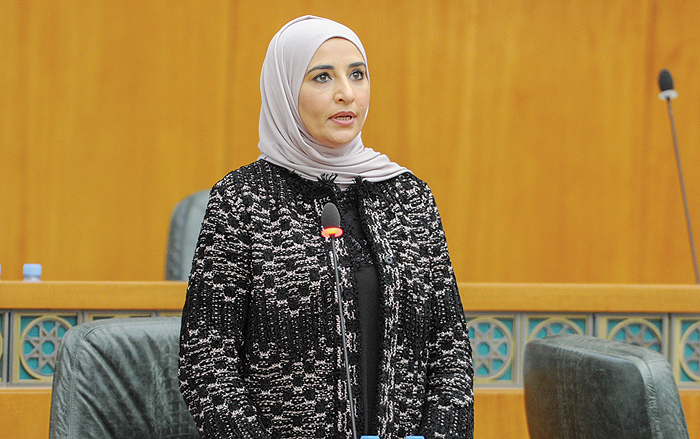Nod to hiring expat Quran teachers in religious schools and institutes

KUWAIT: Setting a time limit for replacing expatriate public sector employees with Kuwaiti manpower is not possible because implementing such plan is closely related to labor market needs and the outcome of the educational system, Minister of State for Economic Affairs Mariam Al-Aqeel explained.
The minister's remarks were quoted in an Al-Rai daily report yesterday, which indicates that she made that clarification in response to demands made by the National Assembly's human resources committee, which called the government to provide it with a 'timed plan' to complete the replacement of expatriate employees in state departments with Kuwaiti staff members.
In this regard, committee chairman MP Khalil Al-Saleh said that during a meeting with Aqeel, the committee asked her, as minister of economic affairs who is directly responsible for all the files of substitution and unemployment, to set specific dates and a timed plan to implement substitution that had remained mere talk by the government for years.
Saleh added that an agreement was made with Aqeel to come up with the plan within a fortnight. "We will only accept a mechanism to put the plan into practice. No more studies, statistics or memos - we need actual implementation of any mechanism the government opts for and reviews with us," he underlined. The committee's rapporteur MP Mohammed Al-Huwailah said that the committee members urged the government to provide them with short and medium term plans to 'Kuwaitize' all government and private sector staff. The government has embarked last year on a plan to create jobs for Kuwaiti manpower by releasing around 80,000 non-Kuwaitis currently working in state departments and have similar qualifications. The plan's ultimate goal is to achieve complete 'Kuwaitization' of public sector jobs within five years of its commencement.
Quran teachers
The finance ministry has no objections to appointing expats who memorize the entire Holy Quran as Quran recitation and memorization teachers in religious schools and institutes, in Quran Houses and memorization circles in return for limited monthly payments, said informed sources. The sources added that the ministry responded to a parliamentary proposal aiming at encouraging people to memorize the Quran. However, the finance ministry remarked that the proposal did not explain the cost of such a decision and called for more coordination with relevant bodies such as the Ministry of Awqaf and Islamic Affairs and the general authority to take care of the printing and publication of Holy Quran and Sunnah and their sciences.
Jordanian universities
A new list with accredited Jordanian universities will be issued in February, said informed sources, noting that the list will also include the names of suspended and discredited universities with the ultimate goal of ensuring high-quality education. The sources explained that the national apparatus for academic accreditation and quality education had already started acting to verify the quality of education at various Jordanian universities a year ago by dispatching special delegations to Jordan.
The sources added that the new list is almost the same as the current one, which includes 12 public and seven private universities. "The change might only be in suspending some universities," the sources remarked, noting that the delegation found that some universities provide special treatment for Kuwait students, which negatively affects the quality of education they get.
By A Saleh and Agencies
.jpg)
